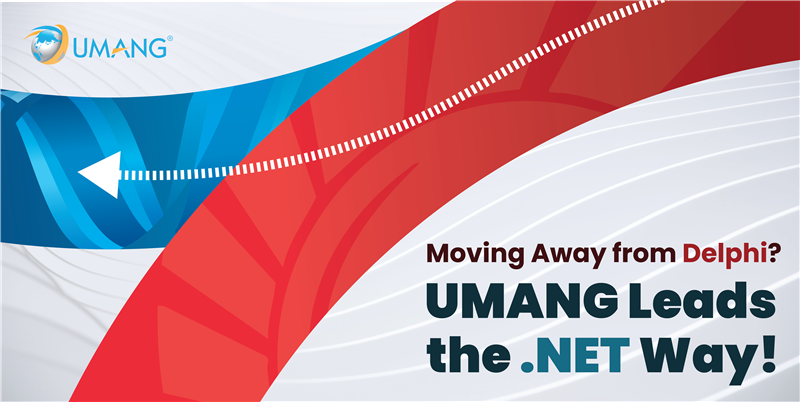Delphi has long been a dependable development environment for building Windows-based desktop applications. However, as the software landscape evolves rapidly, many organizations are finding it necessary to modernize their legacy Delphi applications to remain competitive, secure, and scalable.
Migrating from Delphi to the modern .NET ecosystem is not just a trend—it’s a strategic move. At UMANG, we specialize in helping businesses transition from legacy platforms to modern, cloud-ready architectures with minimal disruption and maximum long-term value.

Why Consider Migrating from Delphi?
While Delphi continues to serve certain use cases, several technical and business factors are driving organizations to consider a migration:
1. Declining Ecosystem and Talent Pool
The Delphi developer community is shrinking, making it increasingly difficult to find skilled professionals for maintenance and development.
2. Integration Limitations
Delphi applications often struggle with modern integration requirements, such as REST APIs, cloud services, and third-party platforms.
3. User Interface Constraints
Applications built in Delphi may lack the responsiveness and aesthetics that modern users expect from enterprise software.
4. Performance and Maintainability
Modern frameworks like .NET offer better memory management, tooling, performance monitoring, and long-term support.
Advantages of Migrating to .NET
.NET, backed by Microsoft, is a powerful and flexible framework designed for building modern enterprise applications. Key advantages include:
Active development, open-source support, and long-term roadmap by Microsoft
Extensive developer community and resource availability
Support for web, desktop, cloud, and mobile applications
Built-in security features and compliance readiness
Seamless integration with Azure, Microsoft 365, and other cloud platforms
UMANG’s Approach to Delphi to .NET Migration
UMANG follows a structured and collaborative approach to ensure that your Delphi systems are not only migrated but modernized in alignment with your business goals.
Assessment and Strategy
We start with a comprehensive analysis of your Delphi codebase, architecture, database, and external integrations. This helps us define a clear migration roadmap.
Code and Logic Translation
Using a combination of automated tools and manual optimization, we translate Delphi code into C# while preserving business logic, ensuring functional parity, and improving maintainability.
UI/UX Transformation
The user interface is reimagined using modern frameworks such as WPF, Blazor, or MAUI. This ensures responsive design, accessibility, and a consistent user experience across platforms.
Architecture Modernization
We refactor monolithic Delphi applications into modular .NET architectures—supporting microservices, containerization, and CI/CD pipelines where appropriate.
Testing and Validation
Every migrated module undergoes rigorous testing to ensure stability, performance, and security compliance. We conduct user acceptance testing (UAT) to align with business expectations.
Case Studies
a) Inventory and Warehouse Management System
A manufacturing client’s Delphi-based system was migrated to ASP.NET Core. The modern solution now integrates with IoT-enabled scanners and supports real-time inventory visibility.
b) Financial Workflow Engine
A mid-sized financial institution required better interoperability and faster processing. We transformed their workflow management system into a set of .NET Core microservices, with enhanced logging, audit trails, and third-party API support.
c) Healthcare Reporting Platform
A diagnostic lab replaced their legacy desktop reporting tool with a .NET-based web application. Post-migration, the lab enabled role-based access, online report delivery, and analytics dashboards powered by Power BI.
Migrating from Delphi to .NET is not merely a technical upgrade—it is a strategic decision that can enhance your product’s scalability, usability, and maintainability. At UMANG, we bring the experience, tools, and processes to manage complex Delphi migrations with precision.
If you are considering a move away from Delphi, UMANG is ready to help you navigate the journey and modernize your application landscape using .NET.
To discuss your migration goals or request more detailed case studies, write to us at click@umangsoftware.com.